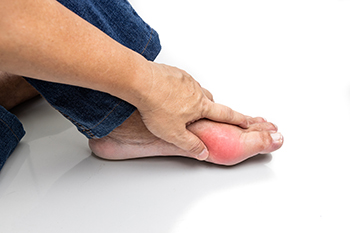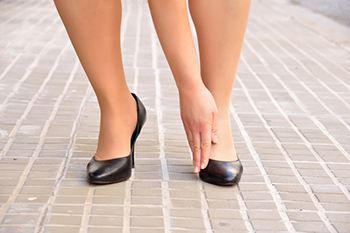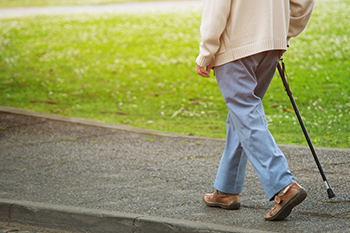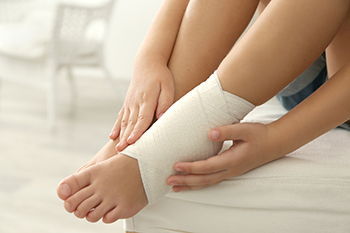Items filtered by date: June 2023
When Do Gout Attacks Commonly Occur?

An early symptom of the foot condition that is known as gout may be detected in the blood. Elevated purine or uric acid levels may indicate gout has developed, which can lead to painful attacks. Gout is a form of arthritis and generally affects the joints in the big toe. It can cause debilitating pain and may be accompanied by swelling and redness. Gout can develop from genetic reasons, or from eating foods that have large amounts of purines. These types of foods can include shellfish, red meat, and drinks that are made with heavy amounts of sugar. Many people have gout attacks at night, and pain can be severe during the first several hours. Effective prevention techniques may consist of reducing the number of foods that are eaten that have purines, eliminating alcohol, and drinking plenty of water daily. If you have had one or frequent gout attacks, it is strongly suggested that you are under the care of a podiatrist who can help you to manage this condition.
Gout is a foot condition that requires certain treatment and care. If you are seeking treatment, contact one of our podiatrists from Summit Podiatry. Our doctors will treat your foot and ankle needs.
What Is Gout?
Gout is a type of arthritis caused by a buildup of uric acid in the bloodstream. It often develops in the foot, especially the big toe area, although it can manifest in other parts of the body as well. Gout can make walking and standing very painful and is especially common in diabetics and the obese.
People typically get gout because of a poor diet. Genetic predisposition is also a factor. The children of parents who have had gout frequently have a chance of developing it themselves.
Gout can easily be identified by redness and inflammation of the big toe and the surrounding areas of the foot. Other symptoms include extreme fatigue, joint pain, and running high fevers. Sometimes corticosteroid drugs can be prescribed to treat gout, but the best way to combat this disease is to get more exercise and eat a better diet.
If you have any questions please feel free to contact one of our offices located in Wilmington, Whiteville, and Wallace, NC . We offer the newest diagnostic and treatment technologies for all your foot and ankle needs.
Wearing High Heels May Cause Ingrown Toenails

A common foot condition that can develop from frequently wearing high heels is ingrown toenails. Despite the pain and discomfort this ailment can cause, many women continue to wear this type of shoe and choose to suffer through the pain. When these types of shoes are worn, pressure can be exerted on the toes, possibly preventing the toenails from growing properly. Additionally, this may cause the nail to puncture the skin, and an infection may ensue. Ingrown toenails may be managed when high heels must be worn by refraining from wearing tight hosiery and soaking the feet in lukewarm water. Patients who have diabetes may need to pay extra attention if they have developed an ingrown toenail. It is beneficial to temporarily stop wearing the high heels that caused the toenail to become ingrown, and an infected ingrown toenail may require minor surgery for relief. If you wear high heels and have developed an ingrown toenail, it is suggested that you confer with a podiatrist who can help you to manage this condition.
High heels have a history of causing foot and ankle problems. If you have any concerns about your feet or ankles, contact one of our podiatrists from Summit Podiatry. Our doctors can provide the care you need to keep you pain-free and on your feet.
Effects of High Heels on the Feet
High heels are popular shoes among women because of their many styles and societal appeal. Despite this, high heels can still cause many health problems if worn too frequently.
Which Parts of My Body Will Be Affected by High Heels?
- Ankle Joints
- Achilles Tendon – May shorten and stiffen with prolonged wear
- Balls of the Feet
- Knees – Heels cause the knees to bend constantly, creating stress on them
- Back – They decrease the spine’s ability to absorb shock, which may lead to back pain. The vertebrae of the lower back may compress.
What Kinds of Foot Problems Can Develop from Wearing High Heels?
- Corns
- Calluses
- Hammertoe
- Bunions
- Morton’s Neuroma
- Plantar Fasciitis
How Can I Still Wear High Heels and Maintain Foot Health?
If you want to wear high heeled shoes, make sure that you are not wearing them every day, as this will help prevent long term physical problems. Try wearing thicker heels as opposed to stilettos to distribute weight more evenly across the feet. Always make sure you are wearing the proper shoes for the right occasion, such as sneakers for exercising. If you walk to work, try carrying your heels with you and changing into them once you arrive at work. Adding inserts to your heels can help cushion your feet and absorb shock. Full foot inserts or metatarsal pads are available.
If you have any questions please feel free to contact one of our offices located in Wilmington, Whiteville, and Wallace, NC . We offer the newest diagnostic and treatment technologies for all your foot and ankle needs.
Gently Exercising May Help to Prevent Falling

People who are 65 years old or older have increased chances of incurring a fall. A common reason this can happen may be a result of decreasing body strength as aging happens. A good fall prevention technique can include implementing a gentle exercise routine that can increase cardiovascular and muscle strength. Falling can have serious consequences, and may affect the feet. A broken ankle or toe may cause pain and difficulty in completing daily activities. Research has shown there are several thousand seniors who live independently, and many falls can occur in the home. Fall prevention strategies can include removing worn rugs from the living area, and it is helpful to improve lighting in the main areas of the household. Many people choose to have grab bars installed in the shower and toilet area, and it is beneficial to use a non-slip bath mat. If you would like to have additional knowledge about effective fall prevention techniques, it is suggested that you consult with a podiatrist who can help you with methods that can protect the feet.
Preventing falls among the elderly is very important. If you are older and have fallen or fear that you are prone to falling, consult with one of our podiatrists from Summit Podiatry. Our doctors will assess your condition and provide you with quality advice and care.
Every 11 seconds, an elderly American is being treated in an emergency room for a fall related injury. Falls are the leading cause of head and hip injuries for those 65 and older. Due to decreases in strength, balance, senses, and lack of awareness, elderly persons are very susceptible to falling. Thankfully, there are a number of things older persons can do to prevent falls.
How to Prevent Falls
Some effective methods that older persons can do to prevent falls include:
- Enrolling in strength and balance exercise program to increase balance and strength
- Periodically having your sight and hearing checked
- Discuss any medications you have with a doctor to see if it increases the risk of falling
- Clearing the house of falling hazards and installing devices like grab bars and railings
- Utilizing a walker or cane
- Wearing shoes that provide good support and cushioning
- Talking to family members about falling and increasing awareness
Falling can be a traumatic and embarrassing experience for elderly persons; this can make them less willing to leave the house, and less willing to talk to someone about their fears of falling. Doing such things, however, will increase the likelihood of tripping or losing one’s balance. Knowing the causes of falling and how to prevent them is the best way to mitigate the risk of serious injury.
If you have any questions, please feel free to contact one of our offices located in Wilmington, Whiteville, and Wallace, NC . We offer the newest diagnostic and treatment technologies for all your foot care needs.
Jumping Rope and Ankle Sprains

Spraining the ankle is certainly no joking matter. When an individual twists or rolls their ankle awkwardly, the ligaments or bands of tissue can be torn, and it is said that the ankle is sprained. There are many ways in which a person might sprain their ankle. For example, a person could sprain their ankle while jumping rope. Since jumping rope requires a person to jump constantly, the feet might land awkwardly at some point. Jumping rope can therefore make one more susceptible to suffering torn ligaments. If you are someone that enjoys frequently jumping rope, then it is suggested that you contact a podiatrist for more information. A podiatrist is a foot specialist that can help you address any problems you might have with your feet and ankles.
Although ankle sprains are common, they aren’t always minor injuries. If you need your ankle injury looked at, contact one of our podiatrists from Summit Podiatry. Our doctors can provide the care you need to keep you pain-free and on your feet.
How Does an Ankle Sprain Occur?
Ankle sprains are the result of a tear in the ligaments within the ankle. These injuries may happen when you make a rapid shifting movement while your foot is planted. A less common way to sprain your ankle is when your ankle rolls inward while your foot turns outward.
What Are the Symptoms?
- Pain at the sight of the tear
- Bruising/Swelling
- Ankle area is tender to touch
- In severe cases, may hear/feel something tear
- Skin discoloration
Preventing a Sprain
- Wearing appropriate shoes for the occasion
- Stretching before exercises and sports
- Knowing your limits
Treatment of a Sprain
In many cases, the RICE method (Rest, Ice, Compression, and Elevate) is used to treat ankle sprains. However, you should see a podiatrist to see which treatment option would work best with your injury. In severe cases, surgery may be required.
It is important to ask your doctor about rehab options after you receive treatment for your injury. Stretching, strength training, and balance exercises may help the ankle heal while also preventing further injury.
If you have any questions, please feel free to contact one of our offices located in Wilmington, Whiteville, and Wallace, NC . We offer the newest diagnostic and treatment technologies for all your foot care needs.

